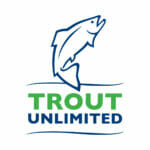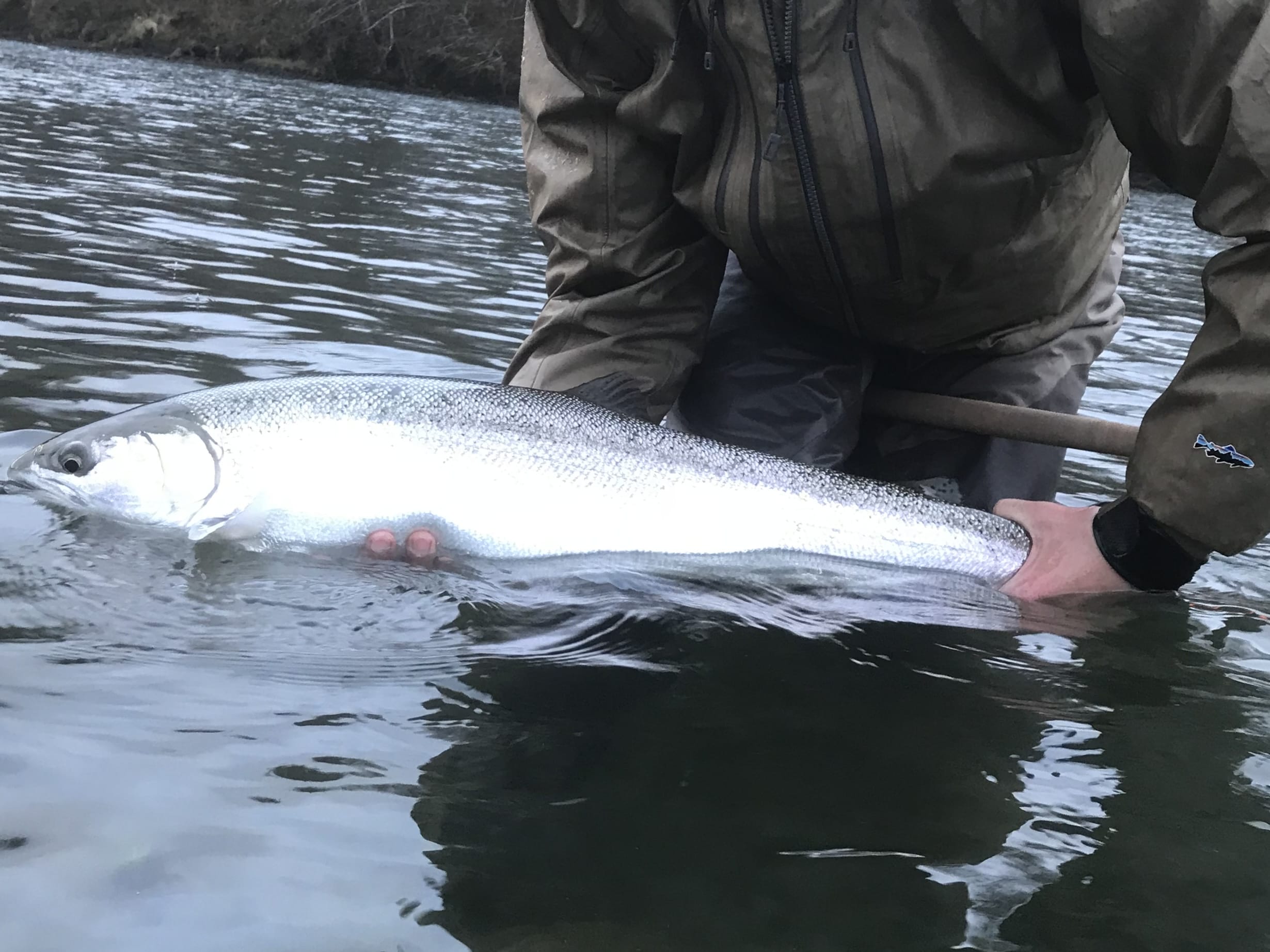“So, where are you guys gonna fish tomorrow?”
Everyone at the high top table went silent and stared at us. Mike and I exchanged glances and shifted in our bar stools. For the last twenty minutes or so, we’d tactfully avoided the question – and therefore having to answer it – while our friends went back and forth on the pros and cons of various rivers, runs, and floats, given the conditions.
“Well…” I began.
The truth was that we hadn’t yet decided and for us, reaching a decision would take most of the night. First, seeing as the three other pairs of anglers that we now joined for dinner had all fished in different places that day, we wanted to hear how everyone else had done. Second, while we hadn’t caught any fish ourselves that day, we liked the conditions on the river we floated and also saw a fish hooked. We were leaning towards doing the same float again but wanted to sit with the decision for a while. We also wanted to see if the flows would change overnight. Plus, we wanted to know if anyone else was going to do the float we wanted. And we would also have to consider the other variables that would come up between now and when we started driving to the river.
“…we thought that we’d…”
At that moment, the waiter returned to the table with a tray of massive cheeseburgers. Everyone’s focus shifted entirely to their dinner. Mike and I caught another glance, realizing that we’d successfully delayed making our decision.
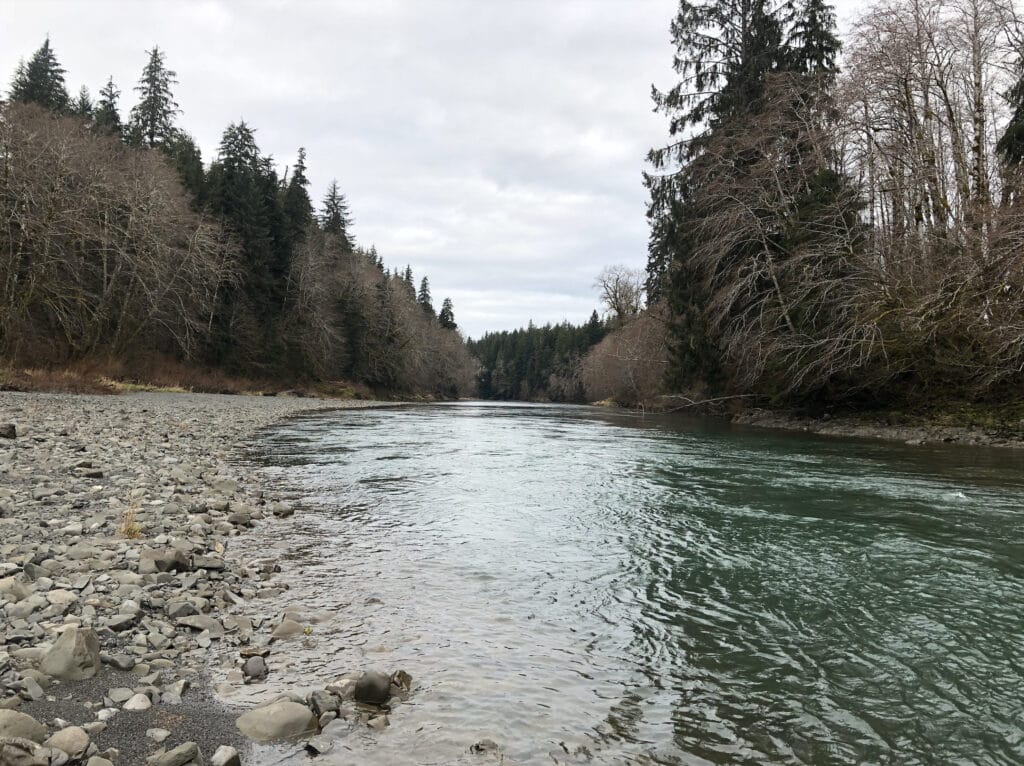
About the OP
Washington’s Olympic Peninsula is a wild and wondrous mass of land, bound by three distinct bodies of saltwater – the Pacific Ocean, Strait of Juan de Fuca, and Hood Canal – and filled with mountains, valleys, rainforests, glaciers, lakes and rivers of all sizes. The interior of the peninsula, and sections of its coastlines, are protected as part of the Olympic National Park, and for this reason the headwaters of most of its rivers lie in pristine areas – unharmed, and difficult to reach. Between all the waters encompassed by the peninsula, all five species of Pacific salmon are present, plus steelhead, bull trout, coastal cutthroat trout and resident rainbows.
Angling on the peninsula can be had year-round and is especially unique because of how dynamic the rivers are and how much they change from one season to the next. Highly variable water flows and migratory fish moving up and down the rivers can make for challenging fishing but also encourage anglers to understand the fisheries and ecosystems in general, as opposed to only the river they’re fishing. In terms of catching fish, steelheading during the winter months may be the least-productive of all the different types of angling available, but in my opinion, it’s also the most rewarding and the most immersive. But sometimes, the hardest part is just deciding where to fish.
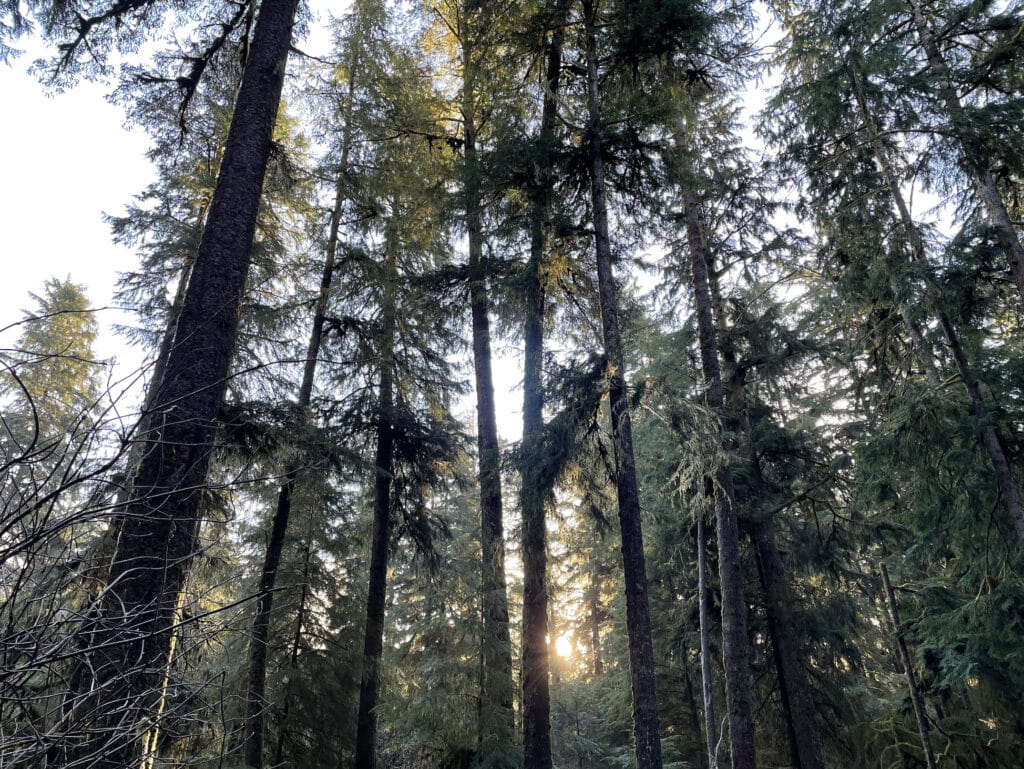
Decisions, decisions
It was still dark the next morning when Mike and I climbed into the truck cab to sip coffee and wait for the engine to warm. We couldn’t delay the decision any longer. Behind us in the campground, another vehicle started and its lights came on. I put the truck in gear.
“Let’s go back,” I said, referring to the river we floated yesterday.
“Yup. We know they’re in there.”
That this final detail could’ve been said about any of the rivers on the peninsula wasn’t discussed and we took off.
Having fished the river the day before was an advantage in that we knew which runs we wanted to fish, and also those that we didn’t want to fish again. We elected for a long float, over ten miles, knowing that we wouldn’t have time to fish it all but also giving ourselves plenty of water to choose from. One run in particular had been coming up in conversation all season and it was near the bottom of our float. We’d been shying away from it, knowing that it was popular and also a favorite of some friends, but as we pushed off from the boat launch, we both agreed that if it was open when we floated by, we should probably fish it.
The fishing
It was a classic day of winter steelheading. It being early-March, the weather changed constantly, switching between drizzle, heavy rain, just clouds, and even some glimmers of sun. We put on and took off layers repeatedly. Zig zagging our way downstream, we stopped on river right to fish a small bucket, then river left for a long gravel run, then back to river right for a ledge dropoff.
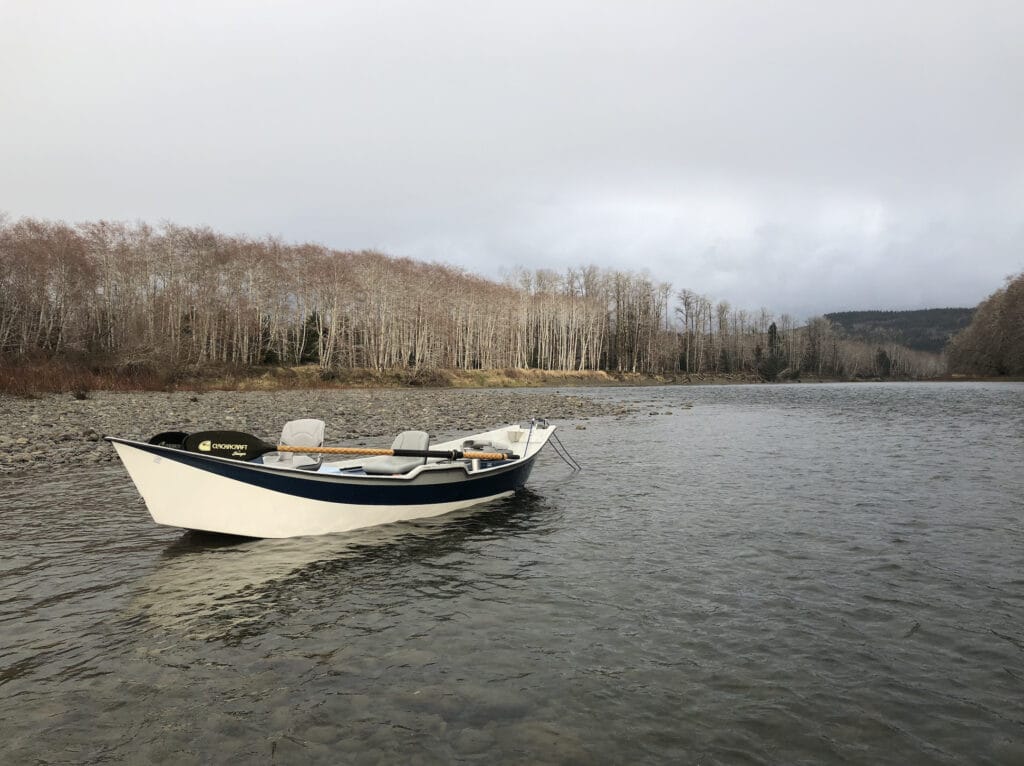
We were having such a good time that we forgot about the time; rather, we forgot how short the days still were. We were both waist deep in the river when I realized that the light was starting to fade. I checked the time; it was nearly 5:00 pm and we still had several miles to float. I yelled to Mike that we should probably get moving downstream. We both reeled in, hopped in the boat, and I started pushing downstream.
I was thinking through the remaining bends of the river when we rounded a corner and the talked-about run appeared. Our conversation stopped and we both craned to see if anyone was fishing. I watched as Mike checked the time on his phone. I could read his mind. This time, there was no deliberation. He turned to look at me.
“You want the top or the bottom?”
I pulled the boat into the shallows at the head of the run. There, Mike slid out of the boat and started pulling line off his reel. I watched him over my shoulder as I floated downstream, gauging the space to leave him and curious if he’d hook one on a short line. Roughly halfway down the run, I softly let the anchor drop and got out of the boat. Knee-deep, the river flowed around my legs but didn’t make a sound.
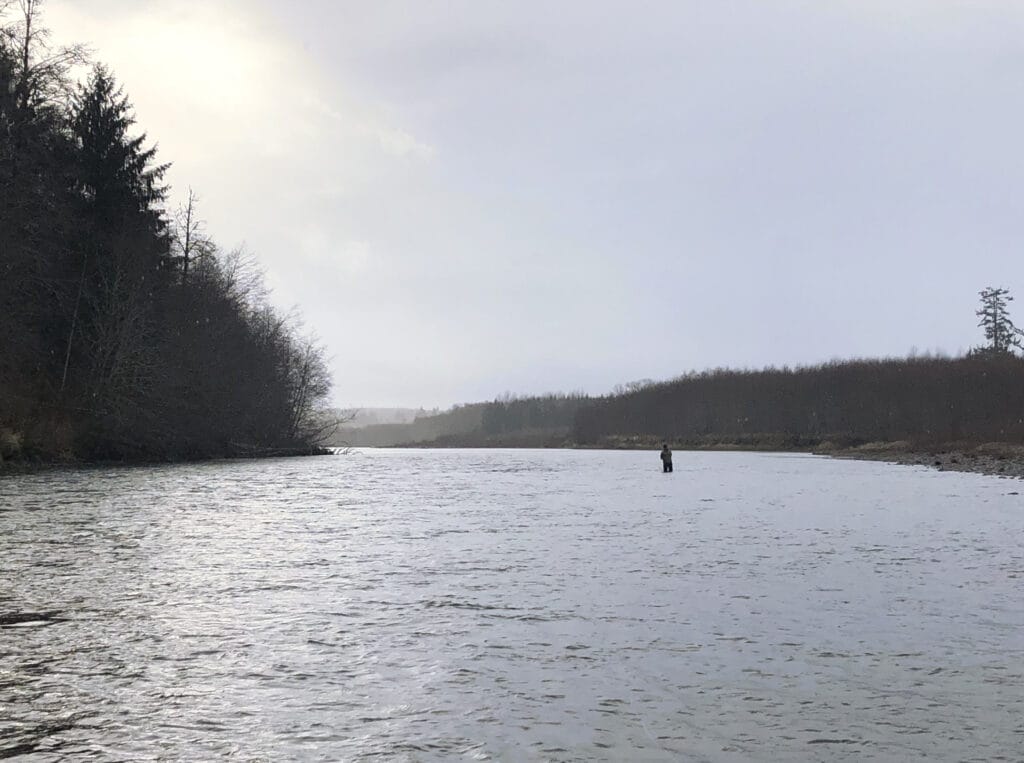
I was still lengthening my casts when the fish took my fly mid-way through the swing, at about 45 degrees to the far side. It was as if the fish was swimming downstream already, my reel shattering the silence. I was dumbfounded and within seconds was in my backing. I started to ask myself what I was going to do next when the fish stopped, did an about face, and screamed directly upstream. I started reeling for all I was worth.
My line was in a massive arc downstream of me and I cringed as I looked at it across the river. Just then, the fish jumped and thrashed directly across the river from me. I looked over my shoulder at its frothing and started to doubt that I would ever see this fish up close.
I don’t know how, but the hook held, and eventually I had the fish to hand. I held it gingerly but firmly, submerging as much of the hen’s body in the cold current as possible. It was so bright, it looked black and white, and had obviously been swimming in the ocean within the last day. An adipose fin confirmed its native origin: it was born in this river and was as wild as the Olympic Peninsula itself. My hands began to numb so I loosened my grip. She sensed as much and, in a flash and spray of water, disappeared back into the rainforest river.
Why the OP is a Priority Water
A longtime Northwest guide once told me, “Steelhead aren’t hard to catch; they’re hard to find.” As migratory fish whose behaviors are still – and probably forever will be – only partially understood, the latter half of this statement has always been apt but unfortunately is increasingly true today. Across the Pacific Northwest, wild steelhead populations are now fractions of their historic runs. River closures, looming Environmental Species Act petitions, and all-too-obvious climate changes are stark examples of the threats to these special fish.

Nevertheless, hope remains, in the face of it all. Dam removals – like those on the Elwha River, also on the Olympic Peninsula – show irrefutable evidence that populations rebound when given access to critical spawning habitat. River restoration projects and policy and fishing regulation changes – like eliminating harvest of wild steelhead – also have measurable effects. And, with time, dedication, some timely decision-making, and a little hope of one’s own, it’s still possible to encounter wild steelhead first-hand.
Another decision
It was dark when we got to the takeout. Hastily, we threw everything in the back of the truck, secured the boat, and hit the road for home. A few minutes down the road, my phone rang. It was a couple of our friends from the night before and I answered on speakerphone. We exchanged reports with them, Mike and I sharing the details of our fish. They congratulated us, then paused before continuing.
“Dare I ask…” one said. “Where are you guys gonna eat dinner?”


